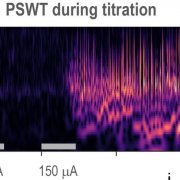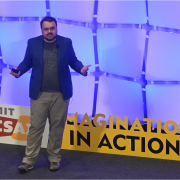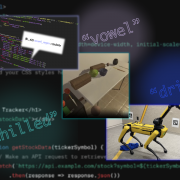September 5, 2024 - 11:30 am
Everybody is talking about some form of artificial intelligence, or AI, these days. But at MBL, two courses have been taking students into real-world, scientific uses of AI for years. Both courses have changed as the explosive growth in the AI field has made ever-more sophisticated tools available – and researchers are racing to add them to their own toolbox.
One course, called “Brains, Minds and Machines,” explores how new work in AI can...
September 3, 2024 - 12:00 pm
Eight researchers today received the Kavli Prize from King Harald.
by Njord V. Svendsen
[translated by Google]
Eight winners of the Kavliprisen 2024 received honor and glory during the ceremony which took place in Oslo Konserthus on Tuesday.
The Kavli Prize is awarded to researchers in astrophysics, neuroscience and nanoscience. The prize money is three million dollars.
Among the recipients are MIT's Nancy Kanwisher, The Rockefeller University'...
September 3, 2024 - 12:00 pm
We are excited to present The Concordia Contest at NeurIPS 2024. This contest challenges participants to advance the cooperative intelligence of language model (LM) agents in rich, text-based environments, based on the recently released Concordia framework which uses language models to create open-ended worlds similar to tabletop role-playing games. The goal of participants in the Concordia contest is to design computational agent architectures...
August 21, 2024 - 1:15 pm
In awake mice, researchers found that even low stimulation currents could sometimes still cause electrographic seizures
The idea of electrically stimulating a brain region called the central thalamus has gained traction among researchers and clinicians because it can help arouse subjects from unconscious states induced by traumatic brain injury or anesthesia, and can boost cognition and performance in awake animals. But the method, called CT-DBS...
June 14, 2024 - 11:00 am
* This article is about recent work at the Kreiman lab outside of his CBMM projects.
There is a class of AI called reinforcement learning (RL), which works by taking actions in an environment and then learning from the outcome. RL agents have become extraordinarily powerful in recent years, beating human experts in chess and Go, learning to play video games, or learning to control robotic systems. In every case, RL has achieved these feats by...
June 12, 2024 - 10:00 am
Citation from the Committee
Recognizing faces is important for social interaction in many animals. Previous work in human psychology, clinical studies of brain-injured patients, positron emission tomography studies, and isolated face-selective neurons in non-human primates, had suggested the existence of a functionally specialized system for face recognition. However, face recognition had not been localized to any specific area of the brain. The...
June 8, 2024 - 3:00 pm
John Werner - Contributor
I am an MIT Senior Fellow, 5x-founder & VC investing in AI
Today I heard from MIT research scientist Andrei Barbu about working with LLMs, and how to prevent certain kinds of problems related to data leaks.
“We’re interested in studying language in particular,” he said of his work, turning to some of the goals of research teams in this area.
Thinking about the duality of human and computer cognition, he pointed out...
May 14, 2024 - 4:00 pm
Room 45-792
This research mission broadly aims to understand how children grasp new concepts from few examples, how children build upon layers of concepts to reach an understanding of the world and have the flexibility to solve an unbounded range of problems. Can we build AI that starts like a baby and learns...
May 14, 2024 - 10:15 am
Carnegie Mellon, UC San Diego top US grant winners for AI research
Science|Business ranks recipients of National Science Foundation grants in AI - and finds an Italian at MIT is the biggest winner
By Raffaele Guerini
The US has been leading global development of artificial intelligence – but which universities are biggest in the sciences underlying the field? A Science|Business analysis of grants by the US National Science Foundation ranks...
May 7, 2024 - 4:00 pm
Bruno Olshausen, UC Berkeley
Abstract: The goal of building machines that can perceive and act in the world as humans and other animals do has been a focus of AI research efforts for over half a century. Over this same period, neuroscience has sought to achieve a mechanistic understanding of the brain processes underlying...
May 1, 2024 - 10:30 am
Three neurosymbolic methods help language models find better abstractions within natural language, then use those representations to execute complex tasks.
Alex Shipps | MIT CSAIL
Large language models (LLMs) are becoming increasingly useful for programming and robotics tasks, but for more complicated reasoning problems, the gap between these systems and humans looms large. Without the ability to learn new concepts like humans do, these systems...
April 19, 2024 - 1:00 pm
[Translated from Italian to English by Google Translate]
History and future of ChatGPT and its sisters in the book just published by the Italian scientist who became famous at the Massachusetts Institute of Technology in Boston. «The genie is out of the bottle, but humans are more dangerous than robots»
by PIERO BIANUCCI
The authors know this. Some books ask to be written. They demand it. Even with a certain arrogance. It happens to those who...
April 18, 2024 - 11:00 am
Online Webinar
Amnon Shashua, Sachs Professor of Computer Science at the Hebrew University of Jerusalem, Founder & CEO,...
*Event time is 11:00pm EDT / 5:00pm CET - Registration required!*
Register for the event here.
Join us on a journey through the history of artificial intelligence (AI) from its early conceptual foundations to today’s Gen AI breakthroughs and tomorrow’s potential futures with:
Amnon Shashua, Sachs...
Register for the event here.
Join us on a journey through the history of artificial intelligence (AI) from its early conceptual foundations to today’s Gen AI breakthroughs and tomorrow’s potential futures with:
Amnon Shashua, Sachs...
April 9, 2024 - 4:00 pm
Room 45-792
This research mission broadly addresses how we perceive the world around us and integrate this information to plan and complete tasks. Scientific goals include research into how perception, planning, and action interface, how we learn efficiently from small data sets and the creation of behavioral...
April 2, 2024 - 4:00 pm
Singleton Auditorium (46-3002)
Melanie Mitchell, Santa Fe Institute
Abstract: I will survey a current, heated debate in the AI research community on whether large pre-trained language models can be said to "understand" language—and the physical and social situations language encodes—in any important sense. I will describe arguments that have been made for and...















